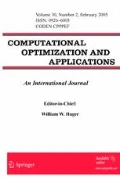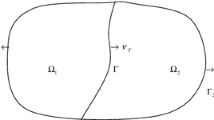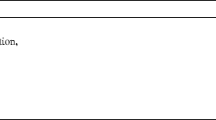Abstract
In this paper, we consider a non-overlapping domain decomposition method combined with the characteristic method for solving optimal control problems governed by linear convection–diffusion equations. The whole domain is divided into non-overlapping subdomains, and the global optimal control problem is decomposed into the local problems in these subdomains. The integral mean method is utilized for the diffusion term to present an explicit flux calculation on the inter-domain boundary in order to communicate the local problems on the interfaces between subdomains. The convection term is discretized along the characteristic direction. We establish the fully parallel and discrete schemes for solving these local problems. A priori error estimates in \(L^2\)-norm are derived for the state, co-state and control variables. Finally, we present numerical experiments to show the validity of the schemes and verify the derived theoretical results.




Similar content being viewed by others
References
Peaceman, D.W.: Fundamentals of Numerical Reservoir Simulation. Elsevier, Amsterdam (1977)
Grossmann, C., Roos, H.G., Stynes, M.: Numerical Treatment of Partial Differential Equations. Springer, Berlin (2007)
Lions, J.L.: Optimal Control of Systems Governed by Partial Differential Equations. Springer, Berlin (1971)
Neittaanmäki, P., Tiba, D.: Optimal Control of Nonlinear Parabolic Systems, Theroy, Algorithms and Applications. Marcel Dekker, INC., New York (1994)
Liu, W.B., Yan, N.N.: Adaptive Finite Element Method for Optimal Control Governed by PDEs. Science Press, Beijing (2008)
Ge, L., Liu, W.B., Yang, D.P.: Adaptive finite element approximation for a constrained optimal control problem via multi-meshes. J. Sci. Comput. 41(2), 238–255 (2009)
Yan, N.N., Zhou, Z.J.: A prior and a posteriori error analysis of edge stabilization Galerkin method for the optimal control problem governed by convection-dominated diffusion equation. J. Comput. Appl. Math. 223(1), 198–217 (2009)
Bartlett, R.A., Heinkenschloss, M., Ridzal, D., Waanders, B.V.B.: Domain decomposition methods for advection dominated linear-quadratic elliptic optimal control problems. Comput. Methods Appl. Mech. Eng. 195, 6428–6447 (2006)
Becker, R., Vexler, B.: Optimal control of the convection–diffusion equation using stabilized finite element methods. Numer. Math. 106(3), 349–367 (2007)
Heinkenschloss, M., Leykekhman, D.: Local error estimates for SUPG solutions of advection-dominated elliptic linear-quadratic optimal control problems. SIAM J. Numer. Anal. 47(6), 4607–4638 (2010)
Zhu, J., Zeng, Q.: A mathematical theoretical frame for control of air pollution. Sci. China Ser. D 32, 864–870 (2002)
Bensoussan, A., Glowinski, R., Lions, J.L.: Mééthode de décomposition appliquée au contrôle optimal de systèmes distribués. In: 5th IFIP Conference on Optimization Techniques, Lecture Notes in Computer Science, p. 5. Springer, Berlin (1973)
Lagnese, J.E., Leugering, G.: Domain Decomposition Methods in Optimal Control of Partial Differential Equations. Volume 148 of International Series of Numerical Mathematics, p. 148. Birkhäuser, Basel (2004)
Benamou, J.D.: Domain decomposition methods with coupled transmission conditions for the optimal control of systems governed by elliptic partial differential equations. SIAM J. Numer. Anal. 33(6), 2401–2416 (1996)
Heinkenschloss, M., Nguyen, H.: Neumann–Neumann domain decomposition preconditioners for linear-quadratic elliptic optimal control problems. SIAM J. Sci. Comput. 28(3), 1001–1028 (2006)
Heinkenschloss, M., Herty, M.: A spatial domain decomposition method for parabolic optimal control problems. J. Comput. Appl. Math. 201, 88–111 (2007)
Hou, L.S., Lee, J.: A Robin–Robin non-overlapping domain decomposition method for an elliptic boundary control problem. Int. J. Numer. Anal. Model. 8(3), 443–465 (2011)
Benamou, J.D.: Domain decomposition, optimal control of system governed by partial differential equations, and sysnthesis of feedback laws. J. Optim. Theory App. 102(1), 15–36 (1999)
Ewing, R.E., Russell, T.F., Wheeler, M.F.: Convergence analysis of an approximation of miscible displacement in porous media by mixed finite elements and a modified method of characteristics. Comput. Methods Appl. Mech. Eng. 47, 73–92 (1984)
Russell, T.F.: Time stepping along characteristics with incomplete iteration for a Galerkin approximation of miscible displacement in porous media. SIAM J. Numer. Anal 22, 970–1013 (1985)
Yuan, Y.R., Chang, L., Li, C.F., Sun, T.J.: Domain decomposition modified with characteristic finite element method for numerical simulation of semiconductor transient problem of heat conduction. J. Math. Res. 7(3), 61–74 (2015)
Huang, C.S.: The modified method of characteristics with adjusted advection and an accelerated domain decomposition procedure. Ph.D. thesis, Purdue University, ProQuest LLC, Ann Arbor, MI (1998)
Ma, K.Y., Sun, T.J., Yang, D.P.: Parallel Galerkin domain decomposition procedures for parabolic equation on general domain. Numer. Methods Partial Differ. Equ. 25(5), 1167–1194 (2009)
Ma, K.Y., Sun, T.J.: Galerkin domain decomposition procedures for parabolic equations on rectangular domain. Int. J. Numer. Methods Fluids 62(4), 449–472 (2010)
Sun, T.J., Ma, K.Y.: Dynamic parallel Galerkin domain decomposition procedures with grid modification for parabolic equation. Int. J. Numer. Methods Fluids 66(12), 1506–1529 (2011)
Sun, T.J., Ma, K.Y.: Domain decomposition procedures combined with \(H^1\)-Galerkin mixed finite element method for parabolic equation. J. Comput. Appl. Math. 267, 33–48 (2014)
Dawson, C.N., Dupont, T.F.: Explicit/Implicit conservative Galerkin domain decomposition procedures for parabolic problems. Math. Comput. 58, 21–35 (1992)
Sun, T.J., Ma, K.Y.: Parallel Galerkin domain decomposition procedures for wave euqation. J. Comput. Appl. Math. 233, 1850–1865 (2010)
Ma, K.Y., Sun, T.J.: Parallel Galerkin domain decomposition procedures based on the streamline diffusion method for convection-diffusion problems. J. Comput. Appl. Math. 235(15), 4464–4479 (2011)
Adams, R.: Sobolev Spaces. Academic, New York (1975)
Lefschetz, S.: Differential Equations: Geometric Theory. Dover, New York (1979)
Fu, H.F., Rui, H.X.: A priori error estimates for optimal control problems governed by transient advection–diffusion equations. J. Sci. Comput. 38, 290–315 (2009)
Houston, P.: Adaptive Lagrange–Galerkin methods for unsteady convection–diffusion problems. Math. Comput. 70, 77–106 (2000)
Süli, E.: Convergence and nonlinear stability of the Lagrange–Galerkin method for the Navier–Stokes equation. Numer. Math. 53, 459–483 (1988)
Douglas, J., Russell, T.F.: Numerical methods for convection-dominated diffusion problems based on combining the method of with finite element or finite difference procedures. SIAM J. Numer. Anal. 19, 871–885 (1982)
Zhu, J.L., Yuan, Z.Q.: Boundary Element Analysis. Science Press, Beijing (2009). (in Chinese)
Brenner, S.C., Scott, L.R.: The Mathematical Theory of Finite Element Method. Volume 15 of Texts in Applied Mathematics. Springer, Berlin (1996)
Ciarlet, P.G.: The Finite Element Method for Elliptic Problems. North-Holland Publication, Amsterdam (1978)
Nitsche, J.: \(L^{\infty }\)-error analysis for finite elements. In: Whiteman, J.R. (ed.) The Mathematics of Finite Elements and Applications III, pp. 173–186. Academic Press, New York (1979)
Schatz, A.H., Wahlbin, L.B.: Maximun norm estimates in the finite element method on plane polygonal domains, I. Math. Comput. 32, 73–109 (1978)
Schatz, A.H., Wahlbin, L.B.: Maximun norm estimates in the finite element method on plane polygonal domains, II. Math. Comput. 33, 485–492 (1979)
Author information
Authors and Affiliations
Corresponding author
Additional information
This work is supported by the NSF of China (Nos. 11301300, 11271231) and the NSF of Shandong Province, China (No. ZR2018MA007).
Rights and permissions
About this article
Cite this article
Sun, T., Ma, K. A non-overlapping DDM combined with the characteristic method for optimal control problems governed by convection–diffusion equations. Comput Optim Appl 71, 273–306 (2018). https://doi.org/10.1007/s10589-018-0008-0
Received:
Published:
Issue Date:
DOI: https://doi.org/10.1007/s10589-018-0008-0




